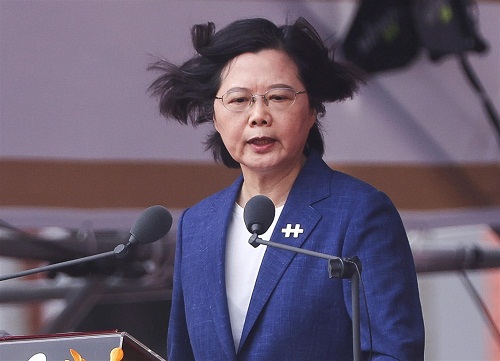The two sides have been ruled separately since the end of the Chinese Civil War in 1949
Taipei, Oct 10 : Taiwan will not bow to pressure by Beijing and will defend its democratic way of life, President Tsai Ing-wen said Sunday, following a spike in incursions by Chinese warplanes into its air defence zone.
Self-governed Taiwan’s 23 million people live under the constant threat of invasion by authoritarian China, which views the island as its territory and has vowed to one day seize it, by force if necessary.
“The more we achieve, the greater the pressure we face from China,” Tsai said in a speech marking Taiwan’s National Day, adding: “Nobody can force Taiwan to take the path China has laid out for us.”
She described Taiwan as “standing on democracy’s first line of defence”.
“We hope for an easing of… relations (with Beijing) and will not act rashly, but there should be absolutely no illusions that the Taiwanese people will bow to pressure,” she added.
The two sides have been ruled separately since the end of the Chinese Civil War in 1949.
Tensions have risen to their highest in decades under Chinese President Xi Jinping, who broke off official communication with Taipei following Tsai’s election five years ago and ramped up economic, diplomatic and military pressure.
The latest flare-up has been a surge in flights by Chinese fighter jets and nuclear-capable bombers into Taiwan’s air defence identification zone (ADIZ).
Some 150 sorties were made into the zone in the days surrounding China’s own National Day on 1 October — a record number.
Xi has made taking Taiwan a key goal of his leadership which he looks set to extend to a third term in 2022.
On Saturday, he declared in a speech that “the complete reunification of our country will be and can be realised”.
He said he favoured “peaceful reunification” but his words come after months of increased military threats, including the recent surge in air incursions as well as heavily publicised military drills simulating an invasion of Taiwan.
Last year, there were a record 380 sorties. There have already been more than 600 this year.
The ADIZ is not the same as Taiwan’s territorial airspace. It includes a far greater area that overlaps with part of China’s own air defence identification zone and even includes some of the mainland.
Tsai, who has won two elections, is loathed by Beijing because she regards Taiwan as an “already independent” country, not part of “one China”.
But she has also made no move to declare formal independence, something Beijing has long warned would be a “red line” that would trigger an invasion.
She has also made offers for talks with Beijing that have been rejected.
During Sunday’s speech, Tsai reiterated her call for Beijing “to engage in dialogue on the basis of parity” and said she supported maintaining the current status quo between the two neighbours.
But she warned what happens to Taiwan would have major regional and global repercussions.
“Every step we take will influence our world’s future direction, and our world’s future direction will likewise affect the future of Taiwan itself,” she said.
Polling shows the vast majority of Taiwanese have no desire to be ruled by Beijing.
Most favour maintaining the status quo although there is a growing Taiwanese nationalist sentiment, especially among younger people.
China’s crackdown in Hong Kong, a city Beijing said would be a model for how it would rule Taiwan, has also done little to endear Taiwanese to assurances that their way of life would continue under communist party rule.
“As a Taiwanese I don’t think we can accept (reunification), just look at what happened in Hong Kong,” Hung Chen-lun, who came with his two children to watch Sunday’s National Day celebrations, told AFP.
Chan Yun-ching, another spectator, said many Taiwanese simply felt helpless.
“Reunification now is not appropriate. But we are in no position to declare independence because the international community will not recognise us. It’s useless,” he said.

















